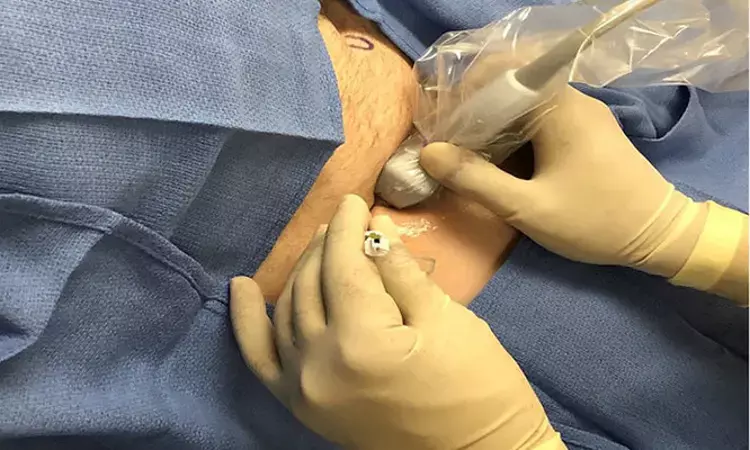- Home
- Medical news & Guidelines
- Anesthesiology
- Cardiology and CTVS
- Critical Care
- Dentistry
- Dermatology
- Diabetes and Endocrinology
- ENT
- Gastroenterology
- Medicine
- Nephrology
- Neurology
- Obstretics-Gynaecology
- Oncology
- Ophthalmology
- Orthopaedics
- Pediatrics-Neonatology
- Psychiatry
- Pulmonology
- Radiology
- Surgery
- Urology
- Laboratory Medicine
- Diet
- Nursing
- Paramedical
- Physiotherapy
- Health news
- Fact Check
- Bone Health Fact Check
- Brain Health Fact Check
- Cancer Related Fact Check
- Child Care Fact Check
- Dental and oral health fact check
- Diabetes and metabolic health fact check
- Diet and Nutrition Fact Check
- Eye and ENT Care Fact Check
- Fitness fact check
- Gut health fact check
- Heart health fact check
- Kidney health fact check
- Medical education fact check
- Men's health fact check
- Respiratory fact check
- Skin and hair care fact check
- Vaccine and Immunization fact check
- Women's health fact check
- AYUSH
- State News
- Andaman and Nicobar Islands
- Andhra Pradesh
- Arunachal Pradesh
- Assam
- Bihar
- Chandigarh
- Chattisgarh
- Dadra and Nagar Haveli
- Daman and Diu
- Delhi
- Goa
- Gujarat
- Haryana
- Himachal Pradesh
- Jammu & Kashmir
- Jharkhand
- Karnataka
- Kerala
- Ladakh
- Lakshadweep
- Madhya Pradesh
- Maharashtra
- Manipur
- Meghalaya
- Mizoram
- Nagaland
- Odisha
- Puducherry
- Punjab
- Rajasthan
- Sikkim
- Tamil Nadu
- Telangana
- Tripura
- Uttar Pradesh
- Uttrakhand
- West Bengal
- Medical Education
- Industry
Fascial plane blocks reduce opioid intake in cardiac surgery patients: BMC

A recent study published in the BMC Anesthesiology found that ultrasound-guided fascial plane blocks were efficient in reducing opioid consumption in patients undergoing open heart surgery. The study led by Burhan Dost and team undertook this systematic review and online meta-analysis to compare the effects of single ultrasound-guided regional anesthetics on postoperative opioid consumption.
This systematic review and online meta-analysis included cardiac surgery patients (age > 18 years) requiring median sternotomy. The team searched PubMed, EMBASE, the Cochrane Central Register of Controlled Trials (CENTRAL), Scopus and Web of Science. The effect of a single ultrasound-guided regional anesthesia technique was compared with a placebo without intervention and performed a risk assessment of eligible studies and assessed the overall quality of evidence for each outcome.
The primary outcome was opioid use within 24 hours of surgery. Secondary outcomes included pain after extubation at 12 and 24 hours, postoperative nausea and vomiting, time to extubation, time to ICU discharge, and length of hospital stay.
The key highlights of the study were:
A total of 15 studies with 849 patients were included.
Regional anesthetic techniques included pectoral-intercostal fascia block, transverse thoracic muscle plane block, erector spinae plane (ESP) and mammary nerve block I.
All regional anesthetic techniques significantly reduced opioid consumption at 2 hours postoperatively, expressed as morphine milligram equivalent (MME). ESP blockade was the most effective treatment (-22.93 MME [-34.29; -11.56]).
In conclusion, fascial plane blocks were better than placebo in evaluating 24-hour MMEs. However, due to the paucity of studies available in the literature, it remains difficult to determine which is better. More randomized controlled trials are needed to determine the efficacy of regional anesthetics.
Reference:
Dost, B., De Cassai, A., Balzani, E., Tulgar, S., & Ahiskalioglu, A. (2022). Effects of ultrasound-guided regional anesthesia in cardiac surgery: a systematic review and network meta-analysis. BMC Anesthesiology, 22(1), 409. https://doi.org/10.1186/s12871-022-01952-7
Neuroscience Masters graduate
Jacinthlyn Sylvia, a Neuroscience Master's graduate from Chennai has worked extensively in deciphering the neurobiology of cognition and motor control in aging. She also has spread-out exposure to Neurosurgery from her Bachelor’s. She is currently involved in active Neuro-Oncology research. She is an upcoming neuroscientist with a fiery passion for writing. Her news cover at Medical Dialogues feature recent discoveries and updates from the healthcare and biomedical research fields. She can be reached at editorial@medicaldialogues.in
Dr Kamal Kant Kohli-MBBS, DTCD- a chest specialist with more than 30 years of practice and a flair for writing clinical articles, Dr Kamal Kant Kohli joined Medical Dialogues as a Chief Editor of Medical News. Besides writing articles, as an editor, he proofreads and verifies all the medical content published on Medical Dialogues including those coming from journals, studies,medical conferences,guidelines etc. Email: drkohli@medicaldialogues.in. Contact no. 011-43720751


